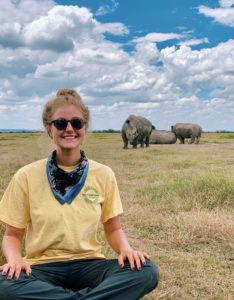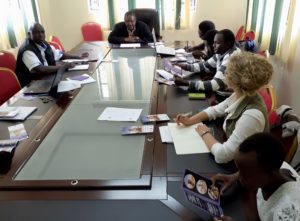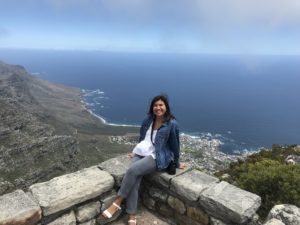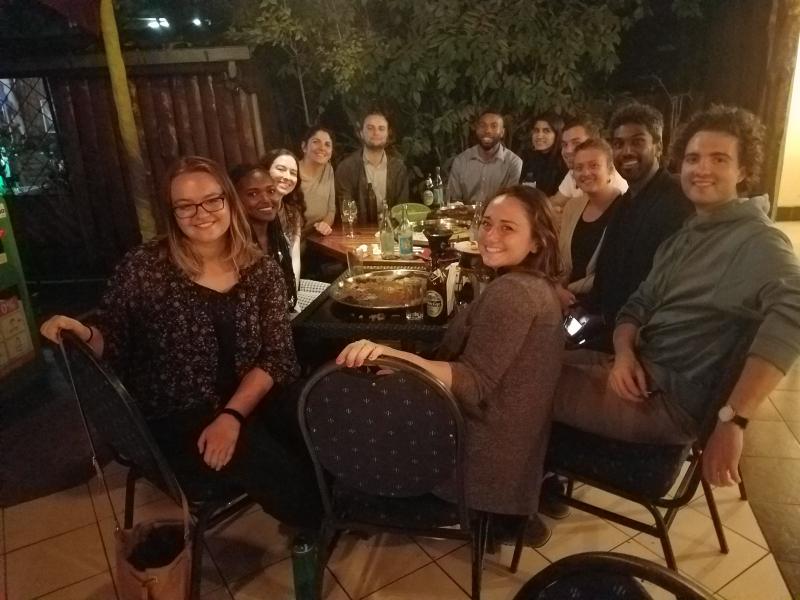March/April 2020
Dear Friends,
We hope that you and your loved ones are well and weathering this pandemic safely.
We started the beginning of March auspiciously with members of the PiAf staff, board and alumni joining our 2019-20 Fellows in Moshi, Tanzania for our annual midyear leadership retreat. It was a wonderful time of reflection, encouragement, goal-setting, and professional development that left our Fellows ready to maximize on their remaining time with their host communities. You can find a few highlights of the retreat here.
However, shortly after returning to their host countries, as many of you know, Princeton in Africa had to make the difficult decision to suspend the 2019-20 fellowship year due to the rising concerns surrounding the COVID-19 pandemic. Even though we are disappointed that the 2019-20 cohort was not able to complete their fellowship year, we are grateful that our Fellows and alumni have found ways to continue supporting their host organizations remotely as well the communities in which they are based. Of note:
- 67% of the 2019-20 Fellows have found ways to continue their work with their host organizations, helping complete the projects they were working on as well as assisting their organizations respond to the COVID-19 pandemic.
- More than 65 alumni (over 10%) are working with different governments and organizations around the world to provide programs, services, and policies aimed at mitigating the impact of the COVID-19 pandemic. Some contributions include advising governments on how COVID-19 response measures may influence drivers of conflict, fragility and violent extremism, working with foundations and individual philanthropists to advance giving in the time of COVID-19, and working as ICU physicians and nurses.
- Of these, nearly 40 alumni are working with different stakeholders across the African continent to create responses to the COVID-19 pandemic, ranging from assessing the impact of the pandemic on the economy, public investment and policy priorities in Rwanda to providing public health support such as soap distribution, creation of hand-washing stations, and broadcasting of radio awareness campaigns in rural Zambia.
- Together with the inaugural Alumni board, 45+ alumni are organizing a series of virtual networking events to provide advice and professional development opportunities to the 2019-20 Fellows as they transition out of their fellowships.
As we continue to navigate these uncertain times, we would like to express our heartfelt gratitude to our Fellows, alumni, board of directors, host organizations, donors, and all the members of the PiAf community who have continued to support us. To continue fulfilling our mission and resolving challenges as they arise, we ask you to renew, and if possible increase your vital contributions and support.
Thank you and all the best.
PiAf Connections
Please click below to check out pictures of our Fellows, Alums and other members of the PiAf family meeting up at home and around Africa.
Notes from the Field
By Megan McDaniels, '19-'20 Fellow with Mpala Research Centre in Kenya

Megan visiting the last two Northern white rhinos on Earth (and their Southern white rhino friend) with a Princeton and Columbia University course. The class was learning about rhino microbiomes and collected dung samples from the Northern white rhinos.
“Mpala is…an interesting place”.
This is how a coworker first introduced me to the world of Mpala Research Centre. What did “interesting” mean? In that middle space of deciding what exactly Mpala is, there are many, many words that could be used.
Mpala is beautiful. We live in a remote area in North-Central Kenya, away from the pleasures of modern life like restaurants and shops. But there is so much to be discovered and enjoyed here. Every drive is a game drive and you never know what you will encounter on the road – African elephants, reticulated giraffe, greater kudu, spotted hyena, and common ostrich share the 48,000 acre property. The research campus where I live teems with wildlife like vulturine guineafowl, Gunther’s dik dik, bushbuck, superb starlings, leopard tortoises, and red billed hornbills (and the occasional tarantula in my room). At night the sky is painted with stars and I’m able to see the Milky Way for the first time in my life. On mornings when the air is clear, proud Mt. Kenya is visible standing watch over Laikipia.
Mpala is a challenging. My work is ever-changing, and as a Science Fellow I am constantly stretched to learn new topics, work with diverse groups of researchers and local stakeholders, and quickly problem solve on my feet. These skills all came together during the 2019 Laikipia Rabies Vaccination Campaign, where I balanced working with local communities to vaccinate their dogs and facilitating volunteers from Mpala, the county government, and a nearby university while taking on new responsibilities like budgeting, fundraising, and managing a limited number of vaccines, medical supplies, and vehicles. In the end we successfully vaccinated nearly 15,000 dogs and cats!

Meeting with the Laikipia County Government during the planning of the 2019 Laikipia Rabies Vaccination Campaign. This project brought together government officials, veterinarians, Mpala researchers, local communities, and students.
Mpala is surprising. In this wild place, I am living my healthiest, most grounded life. I’m constantly outdoors, eat nutritious local fruits and veggies, and rise and fall with the equatorial sun. I’m writing, reading, and drawing more than ever. Even through experiences that are uncomfortable, frustrating, or scary, I am cultivating resilience, self-reliance, and plenty of patience. Though we’re far from town, Mpala is like a mini-city and I’m learning about the intricacies of Kenyan life and culture from the people I live and work with. I truly learn new things every day.
Mpala is rewarding. I have met fascinating people from around the world and have had the opportunity to be a part of many projects like the Great Grevy’s Rally citizen science census of endangered zebra. Meals at Mpala are communal and lead to engaging discussions about everything from ecology to philosophy. Being here has solidified my aspirations to be a conservation scientist, and I’m deeply grateful to have rekindled my motivation and vision for this goal.
But how can I ever sum up these complex and contrasting experiences to people outside of Mpala? When I go home, I’ll tell everyone – without hesitation – that “Mpala is an interesting place”.
Notes from the Field
By Naomi Medina-Jaudes, '19-'20 Fellow with Clinton Health Access Initiative in Eswatini

Naomi at the top of the Table Mountain while on a trip to Cape Town!
Sanibonani, from Mbabane, Eswatini! When my predecessor told me that Mbabane was one of the most beautiful places she had ever lived, I didn’t truly comprehend her statement until I arrived. Nestled in mountains and valleys, the Mbabane landscape continues to leave me in awe as I approach the six-month mark of my fellowship year. I even look forward to the daily drive to the office where I work as an Analyst at the Clinton Health Access Initiative (CHAI), despite having to be there before 8am.
CHAI works primarily as a government partner, providing technical assistance and support to the Ministry of Health. In my specific role on the Sustainable Health Financing team, I support the development of the annual budget, the newly instituted cancer control program, and an ongoing campaign to introduce the Human Papillomavirus (HPV) vaccine in Eswatini. I’ve enjoyed getting integrated as a member of the CHAI Eswatini office and building relationships in the Ministry, which is imperative to accomplishing tasks and producing quality work. Having not previously worked in the non-governmental organization (NGO) space before, I feel that I learn so much each day just by being in the office.

Naomi with two of her close friends in Mbabane at an event for their local youth group.
I’ve found myself drawn to the work I do with vaccines in particular, and a highlight of the year thus far has been the opportunity to attend a World Health Organization (WHO) workshop on improving access to affordable vaccines for middle-income countries, a workshop that Eswatini hosted at the end of October. The workshop brought together representatives from the governments of ten countries all over the African continent, as well as partner organizations and pharmaceutical companies. I attended to collect some information for our Global Vaccines team, which had been unable to attend. The experience was invaluable as I learned more about vaccine and medicine procurement, supply chain management, the barriers that countries face in procurement, and the roles that each stakeholder plays in successful vaccine introductions. Eswatini, like other low-middle-income countries, is in a difficult position when it comes to procurement. The country is not poor enough (in terms of GDP per capita) to qualify for financial assistance through organizations like Gavi, a vaccine alliance, but still is not able to afford procuring directly from suppliers. The small population size of Eswatini – about 1.2 million – makes it even more difficult to get affordable prices, since the government procures much smaller volumes compared to other countries.
When I’m not in the office, I try to take advantage of all the nature that Eswatini has to offer. From hiking various mountain ranges and rock climbing behind a local school, to playing ultimate frisbee and running 10ks, I’ve found ways to meet members of my local community while remaining active and exploring the country. As I approach the halfway point of my fellowship, I hope to continue to absorb as much of this experience as I can and continue to be awed by Eswatini.


